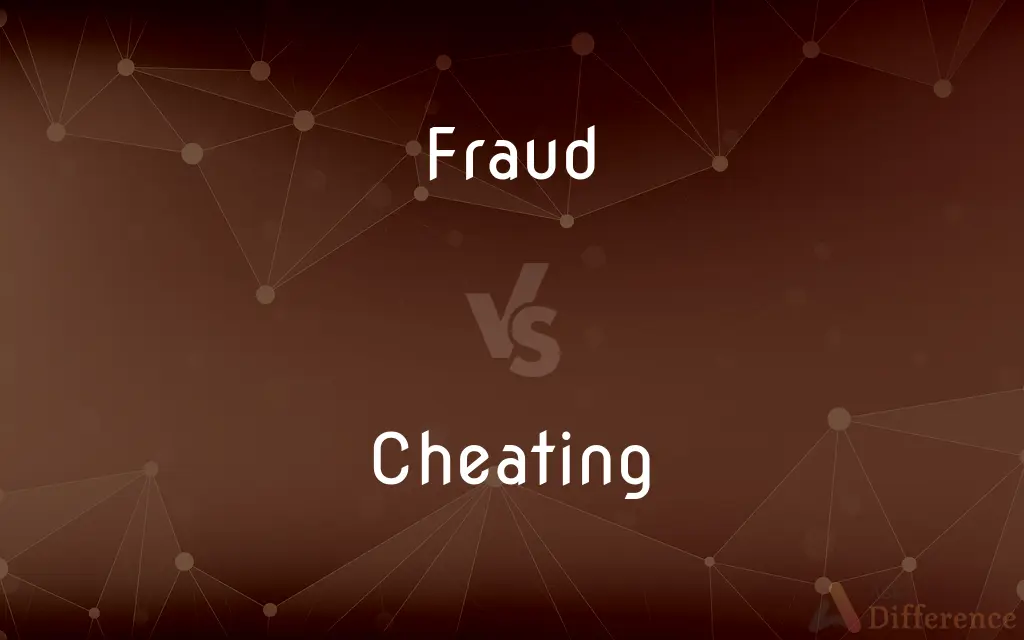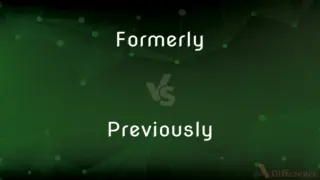Fraud vs. Cheating — What's the Difference?
Edited by Tayyaba Rehman — By Urooj Arif — Updated on March 30, 2024
Fraud involves deceiving someone for personal gain, often legally punishable, whereas cheating breaks rules or agreements to gain an unfair advantage, not always illegal but ethically wrong.

Difference Between Fraud and Cheating
Table of Contents
ADVERTISEMENT
Key Differences
Fraud and cheating are both dishonest actions, but they differ significantly in their application and repercussions. Cheating, on the other hand, pertains to the violation of rules or agreements to gain an unfair advantage, such as in games, academic examinations, or relationships. While not always illegal, cheating is considered unethical and can lead to social or institutional penalties.
Fraud typically involves complex deceit and can affect individuals, groups, or organizations on a large scale, requiring investigation and prosecution by legal authorities. Examples include credit card fraud, identity theft, and insurance fraud. Cheating, in contrast, often occurs in more personal or less formal settings, such as in sports or academic settings, and the consequences are usually determined by the governing bodies or institutions, rather than through legal proceedings.
The intention behind fraud is usually financial gain or to cause financial harm to others, making it a crime against property or financial assets. Cheating’s motives can vary widely, from seeking to improve one’s grades without earning them to gaining a competitive edge in sports or games, reflecting a broader range of unethical behavior that may or may not involve financial gain.
Legal recourse is a key difference between the two; victims of fraud can often seek redress in court, leading to possible restitution, fines, or imprisonment for the perpetrator. Those affected by cheating may seek resolution through institutional policies or personal confrontation, but legal options are typically limited unless the cheating overlaps with legally recognized forms of fraud.
Despite these differences, both fraud and cheating undermine trust and integrity in personal, academic, professional, and financial relationships, highlighting the importance of honesty and ethical conduct in all areas of life.
ADVERTISEMENT
Comparison Chart
Definition
Deception for personal or financial gain
Breaking rules or agreements for unfair advantage
Legal Status
Recognized by law, with legal penalties
Not always illegal, but ethically wrong
Scope
Can affect a wide range, often large scale
Typically occurs in personal, academic, or sports settings
Motivation
Primarily financial gain or harm
Varied, not exclusively financial
Recourse
Legal action possible, including restitution
Usually resolved through institutional or personal means
Compare with Definitions
Fraud
Recognized in various forms, including financial and identity fraud.
Phishing scams are a common method of committing online fraud.
Cheating
Violating rules to gain an advantage.
She was caught cheating during the exam by using her smartphone.
Fraud
Often involves manipulation of information.
Using someone else’s identity to apply for a credit card is a form of fraud.
Cheating
Undermines fairness and integrity.
Cheating in a relationship breaks trust and can end partnerships.
Fraud
Carries legal penalties such as fines or imprisonment.
He was sentenced to five years in prison for bank fraud.
Cheating
Not exclusively financial, often motivated by competition or personal gain.
Cheating in a game to win against friends.
Fraud
A deliberate deception to secure unfair or unlawful gain.
Committing insurance fraud by exaggerating damages.
Cheating
Can occur in academic, sports, or personal relationships.
Doping to enhance performance in sports is a form of cheating.
Fraud
Requires intent to deceive and cause loss.
Falsifying financial statements to mislead investors constitutes fraud.
Cheating
Ethically wrong and can lead to social or institutional penalties.
The student was expelled for cheating on multiple tests.
Fraud
In law, fraud is intentional deception to secure unfair or unlawful gain, or to deprive a victim of a legal right. Fraud can violate civil law (e.g., a fraud victim may sue the fraud perpetrator to avoid the fraud or recover monetary compensation) or criminal law (e.g., a fraud perpetrator may be prosecuted and imprisoned by governmental authorities), or it may cause no loss of money, property, or legal right but still be an element of another civil or criminal wrong.
Cheating
Cheating generally describes various actions designed to subvert rules in order to obtain unfair advantages. This includes acts of bribery, cronyism and nepotism in any situation where individuals are given preference using inappropriate criteria.
Fraud
A deception practiced in order to induce another to give up possession of property or surrender a right.
Cheating
To deceive by trickery; swindle
Cheated customers by overcharging them for purchases.
Fraud
A piece of trickery; a trick.
Cheating
To deprive by trickery; defraud
Cheated them of their land.
Fraud
One that defrauds; a cheat.
Cheating
To mislead; fool
Illusions that cheat the eye.
Fraud
One who assumes a false pose; an impostor.
Cheating
To elude; escape
Cheat death.
Fraud
(law) The crime of stealing or otherwise illegally obtaining money by use of deception tactics.
Cheating
To act dishonestly; practice fraud.
Fraud
Any act of deception carried out for the purpose of unfair, undeserved and/or unlawful gain.
Cheating
To violate rules deliberately, as in a game
Was accused of cheating at cards.
Fraud
The assumption of a false identity to such deceptive end.
Cheating
(Sports) To position oneself closer to a certain area than is normal or expected
The shortstop cheated toward second base.
Fraud
A person who performs any such trick.
Cheating
An act of cheating; a fraud or swindle.
Fraud
(obsolete) A trap or snare.
Cheating
One who cheats; a swindler.
Fraud
(obsolete) To defraud
Cheating
A technique that exploits a flaw or hidden feature in a video game or computer program.
Fraud
Deception deliberately practiced with a view to gaining an unlawful or unfair advantage; artifice by which the right or interest of another is injured; injurious stratagem; deceit; trick.
If success a lover's toil attends,Few ask, if fraud or force attained his ends.
Cheating
(Law) Fraudulent acquisition of another's property.
Fraud
An intentional perversion of truth for the purpose of obtaining some valuable thing or promise from another.
Cheating
(Botany) Any of several species of brome, especially Bromus secalinus, an annual European grass widespread as a weed.
Fraud
A trap or snare.
To draw the proud King Ahab into fraud.
Cheating
Present participle of cheat
Fraud
Intentional deception resulting in injury to another person
Cheating
An act of deception, fraud, trickery, imposture, imposition or infidelity.
Fraud
A person who makes deceitful pretenses
Cheating
(cinematography) The arrangement of people or items in a film so as to give the (false) impression that shots are taken from different angles in the same location.
Fraud
Something intended to deceive; deliberate trickery intended to gain an advantage
Cheating
Unsporting or underhand.
Cheating
A deception for profit to yourself
Cheating
Violating accepted standards or rules;
A dirty fighter
Used foul means to gain power
A nasty unsporting serve
Fined for unsportsmanlike behavior
Common Curiosities
What are the consequences of committing fraud?
Consequences can include legal penalties such as fines, restitution, and imprisonment.
What constitutes fraud?
Fraud involves deliberate deception to secure an unfair or unlawful gain, often financial in nature.
Are there legal penalties for cheating?
Legal penalties for cheating are rare unless it intersects with acts recognized as fraud by law.
Can cheating be considered a form of fraud?
In some contexts, cheating can overlap with fraud, especially if it involves financial deceit or legal contracts.
Why is cheating considered unethical?
Cheating is unethical because it violates fairness and integrity, undermining trust in relationships and institutions.
Is fraud always a criminal act?
Yes, fraud is considered a criminal act because it involves deceit for gain or harm and is punishable by law.
Can victims of fraud recover their losses?
Victims may recover losses through legal action, though recovery depends on the perpetrator’s ability to pay restitution.
How does cheating differ from fraud?
Cheating involves breaking rules or agreements to gain an advantage, and while unethical, it is not always illegal like fraud.
How is fraud detected?
Fraud is often detected through audits, investigations, or whistleblowing.
What motivates individuals to commit fraud?
Motivations can include financial pressure, greed, or the perceived low risk of getting caught.
Does cheating always involve a direct victim?
While not always directly harming others, cheating invariably affects fairness and can disadvantage others indirectly.
What can be done to prevent cheating?
Preventive measures include strict rules, monitoring, and fostering an ethical environment.
How can one protect themselves against fraud?
Protecting against fraud involves vigilance, protecting personal information, and skepticism towards too-good-to-be-true offers.
How do institutions handle cheating?
Institutions typically have policies outlining consequences for cheating, which can include failure, suspension, or expulsion.
How do societal views on fraud and cheating differ?
Society often views fraud more severely due to its legal implications and potential for significant harm, while cheating is seen as a breach of ethical conduct.
Share Your Discovery

Previous Comparison
Cicero vs. Pica
Next Comparison
Formerly vs. PreviouslyAuthor Spotlight
Written by
Urooj ArifUrooj is a skilled content writer at Ask Difference, known for her exceptional ability to simplify complex topics into engaging and informative content. With a passion for research and a flair for clear, concise writing, she consistently delivers articles that resonate with our diverse audience.
Edited by
Tayyaba RehmanTayyaba Rehman is a distinguished writer, currently serving as a primary contributor to askdifference.com. As a researcher in semantics and etymology, Tayyaba's passion for the complexity of languages and their distinctions has found a perfect home on the platform. Tayyaba delves into the intricacies of language, distinguishing between commonly confused words and phrases, thereby providing clarity for readers worldwide.















































